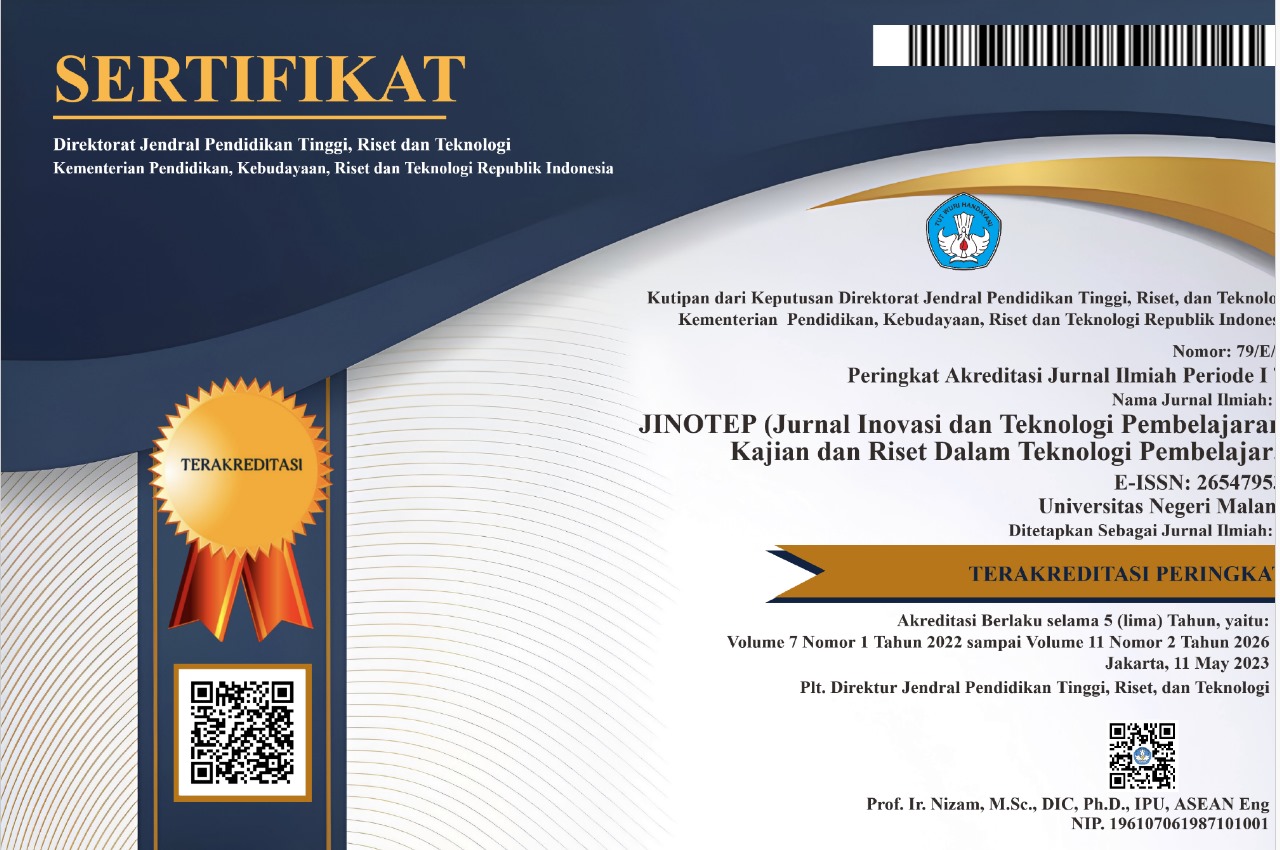Pengembangan Sistem Informasi E-Lesson Plan Pada Pendidikan Anak Usia Dini
Abstract
Abstrak: Penelitian ini didasari oleh kebutuhan pengelolaan data perencanaan pembelajaran yang dilakukan pendidik berbasis sistem informasi. Penelitian bertujuan mengembangkan sistem informasi e-lesson plan PAUD yang memfasilitasi pendidik dalam pengambilan keputusan perencanaan pembelajaran meliputi kalender pendidikan, rancangan semester, rancangan mingguan dan rancangan harian. Model pengembangan prototipe digunakan dalam proses penelitian ini. Evaluasi formatif oleh pengguna yaitu pendidik anak usia dini, menunjukkan tingkat kesesuaian dengan unsur-unsur perangkat pembelajaran sebesar 83,3%, dan tingkat kepraktisan sistem sebesar 84,2%. Kepraktisan dan kesesuaian sistem informasi e-lesson plan PAUD berpengaruh sebesar 73,3% dalam pengelolaan data keputusan perencanaan yang dilakukan oleh pendidik. Hasil penelitian menunjukkan e-lesson plan PAUD praktis dan sesuai digunakan dalam keputusan penyusunan perangkat perencanaan pembelajaran oleh pendidik.
Abstract: The researcher focuses based on the need for data management of learning planning carried out by educators based on information systems. The research objective is to develop an e-lesson plan early childhood education information system that facilitates educators in making learning planning decisions, including educational calendars, semester programs, weekly programs and daily programs. The researcher chose the prototype development model used in this research process. Formative evaluation by users, namely early childhood educators, showed that conformity with the elements of learning tools was 83.3%, and the practicality level of the system was 84.2%. The practicality and suitability of the PAUD e-lesson plan information system affect 73.3% in the management of planning decision data made by educators. The results of the study show that the PAUD e-lesson plan is practical and suitable for use in making decisions about learning planning tools by educators.
Keywords
Full Text:
PDFReferences
Blackwell, C. K., Lauricella, A. R., Wartella, E., Robb, M., & Schomburg, R. (2013). Adoption and use of technology in early education: The interplay of extrinsic barriers and teacher attitudes. Computers and Education, 69, 310–319. https://doi.org/10.1016/j.compedu.2013.07.024
Cohen, L., & Manion, L. (1994). Research menthods in education (Edisi ke-4). In Research Methods in Education. Routledge.
Creswell, J. (2015). Educational Research Planning, Conducting, and Evaluating Quantitative and Qualitative-Fifth Edition (Fifth). Pearson Education, Inc.
DeLone, W. H., & McLean, E. R. (2016). Information Systems Success Measurement. Foundations and Trends® in Information Systems, 2(1), 1–116. https://doi.org/10.1561/2900000005
Direktorat Pembinaan Pendidikan Anak Usia. (2015). Pedoman Pengelolaan Pembelajaran Pendidikan Anak Usia Dini. Jakarta: Direktorat Jenderal Pendidikan Anak Usia Dini dan Pendidikan Masyarakat. Kementrian Pendidikan dan Kebudayaan.
Fitriani, L. (2019). Perencanaan Sistem Informasi Administrasi di Pendidikan Anak Usia Dini. Jurnal Algoritma, 15(2), 79–83. https://doi.org/10.33364/algoritma/v.15-2.79
Fitriawati, M., & Lestari, R. H. (2018). Design of the Information System for Kindergarten Learning Plan used Scrum Methodology. IOP Conference Series: Materials Science and Engineering, 407(1). https://doi.org/10.1088/1757-899X/407/1/012131
Gunawan, I. (2017). Indonesian Curriculum 2013: Instructional Management, Obstacles Faced by Teachers in Implementation and the Way Forward. 3rd International Conference on Education and Training (ICET). https://doi.org/10.2991/icet-17.2017.9
Henson, K. L., & Knezek, G. A. (1991). The use of prototyping for educational software development. Journal of Research on Computing in Education, 24(2), 230–239. https://doi.org/10.1080/08886504.1991.10782004
Huda, N. (2017). Manajemen Pengembangan Kurikulum. Al-Tanzim : Jurnal Manajemen Pendidikan Islam, 1(2), 52–75. https://doi.org/10.33650/al-tanzim.v1i2.113
Janssen, N., Knoef, M., & Lazonder, A. W. (2019). Technological and pedagogical support for pre-service teachers’ lesson planning. In Technology, Pedagogy and Education (Vol. 28, Issue 1, pp. 115–128). https://doi.org/10.1080/1475939X.2019.1569554
Johnson, A. P. (2000). It’s Time for Madeline Hunter to Go: A New Look at Lesson Plan Design. Action in Teacher Education, 22(1), 72–78. https://doi.org/10.1080/01626620.2000.10462994
Jurado, R. G., Petterson, T., Gomez, A. R., & Scheja, M. (2013). Classification of the Features in Learning Management Systems. In XVII Scientific Convention on Engineering and Architecture, Havana City, Cuba, Nov 24th-28. XVII Scientific Convention on Engineering and Architecture, 53(9), 1689–1699. https://doi.org/10.1017/CBO9781107415324.004
Kurikulum 2013 PAUD, Pub. L. No. Nomor 146 Tahun 2014 (2014).
Standar Isi Tentang Tingkat Pencapaian Perkembangan Anak, Pub. L. No. Nomor 137 Tahun 2014, Peraturan Menteri Pendidikan dan Kebudayaan Republik Indonesia Nomor 137 Tahun 2014 1 (2014).
König, J., Bremerich-Vos, A., Buchholtz, C., Fladung, I., & Glutsch, N. (2020). Pre–service teachers’ generic and subject-specific lesson-planning skills: On learning adaptive teaching during initial teacher education. European Journal of Teacher Education, 43(2), 131–150. https://doi.org/10.1080/02619768.2019.1679115
Leksono, F., Sulton, S., & Susilaningsih. (2018). Implementasi Kurikulum 2013 PAUD Di Tk TPI Nurul Huda Malang. JINOTEP (Jurnal Inovasi Dan Teknologi Pembelajaran) Kajian Dan Riset Dalam Teknologi Pembelajaran, 4(2), 126–131. https://doi.org/https://doi.org/10.17977/um031v4i22018p126
Maman, U., Sugiarti, Y., & Ratnawati, S. (2016). Learning system design using knowledge management systems to improve the competency of early childhood education teachers. Proceedings of 2016 4th International Conference on Cyber and IT Service Management, CITSM 2016. https://doi.org/10.1109/CITSM.2016.7577577
Milkova, S. (2005). Strategies for Effective Lesson Planning Stiliana Milkova Center for Research on Learning and Teaching. In crlt.umich.edu (Issue 2). http://gsi.
Standar Nasional Pendidikan Anak Usia Dini, Pub. L. No. Nomor 137 Tahun 2014, 1 (2014).
Mulyasa, E. (2014). Manajemen Paud. In Manajemen PAUD.
Pedoman Pembelajaran, Pub. L. No. Nomor 146 Tahun 2014 (2014).
Pressman, R. S. (2005). Software engineering: a practitioner's approach. Palgrave macmillan.
Putri, N. E., Elizamiharti, E., & Arman, A. (2021). Sistem Informasi Pendataan Pelanggaran Peraturan Daerah Pada Satuan Polisi Pamong Praja Kota Padang. JOSTECH: Journal of Science and Technology, 1(1), 20-34.
Rahelly, Y. (2018). Implementasi Kurikulum 2013 Pendidikan Anak Usia Dini (Paud) Di Sumatera Selatan. JPUD - Jurnal Pendidikan Usia Dini, 12(2), 381–390. https://doi.org/10.21009/jpud.122.21
Ramírez, E., Clemente, M., Recamán, A., Martín-Domínguez, J., & Rodríguez, I. (2017). Planning and Doing in Professional Teaching Practice. A Study with Early Childhood Education Teachers Working with ICT (3–6 years). Early Childhood Education Journal, 45(5), 713–725. https://doi.org/10.1007/s10643-016-0806-x
Richards, J. C., Richards, J. C. R., & Lockhart, C. (1994). Reflective teaching in second language classrooms. Cambridge university press.
Sahin-Taskin, C. (2017). Exploring Pre-service Teachers’ Perceptions of Lesson Planning in Primary Education. Journal of Education and Practice, 8(12), 57–63. www.iiste.org
Shah, M. (2014). Impact of Management Information Systems (MIS) on School Administration: What the Literature Says. Procedia - Social and Behavioral Sciences, 116, 2799–2804. https://doi.org/10.1016/j.sbspro.2014.01.659
Sugiyono. (2012). Metode Penelitian Kuantitatif, Kualitatif dan R & D.Bandung:Alfabeta. Metode Penelitian Kuantitatif, Kualitatif Dan R & D.Bandung:Alfabeta. https://doi.org/10.1017/CBO9781107415324.004
Sum, T. A., & Taran, E. G. M. (2020). Kompetensi Pedagogik Guru PAUD dalam Perencanaan dan Pelaksanaan Pembelajaran. Jurnal Obsesi : Jurnal Pendidikan Anak Usia Dini. https://doi.org/10.31004/obsesi.v4i2.287
Susanto, R., & Andriana, A. D. (2016). Perbandingan Model Waterfall Dan Prototyping Untuk Pengembangan Sistem Informasi. Majalah Ilmiah UNIKOM, 14(1), 41–46. https://doi.org/10.34010/miu.v14i1.174
Warni, P., & Wicaksono, S. R. (2015). Rancang Bangun Sistem Informasi Akademik pada PAUD Omah Bocah Annaafi’. Smatika, 05(02), 45–50.
Westerman, D. A. (1991). Expert and Novice Teacher Decision Making. Journal of Teacher Education, 42(4), 292–305. https://doi.org/10.1177/002248719104200407
DOI: http://dx.doi.org/10.17977/um031v8i22021p146
Refbacks
- There are currently no refbacks.
Copyright (c) 2021 Leni Gonadi

This work is licensed under a Creative Commons Attribution-ShareAlike 4.0 International License.
======================================================================
Jurnal Inovasi dan Teknologi Pembelajaran published by Universitas Negeri Malang in collaboration with the Asosiasi Program Studi Teknologi Pendidikan Indonesia (APS TPI) and Ikatan Profesi Teknologi Pendidikan Indonesia (IPTPI) with a MoU.
Publisher Address:
Educational Technology Laboratorium, Building D5, 1st Floor
Faculty of Education, Universitas Negeri Malang
Semarang St. No. 5, Malang City, East Java Province, Postal Code 65145
Email: jinotep.fip@um.ac.id
======================================================================

JINOTEP is licensed under a Creative Commons Attribution-ShareAlike 4.0 International License.
JINOTEP Statistics (Since July 13th, 2020)



.png)




.png)
1.png)
1.png)
4.png)
2.png)
1.png)
1.png)
.png)


_3.png)





1.png)
.png)